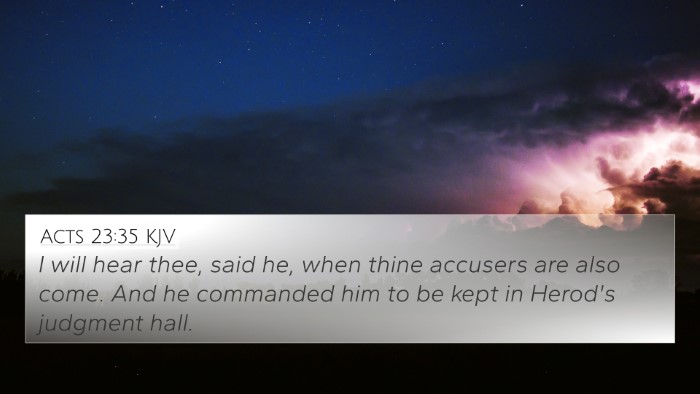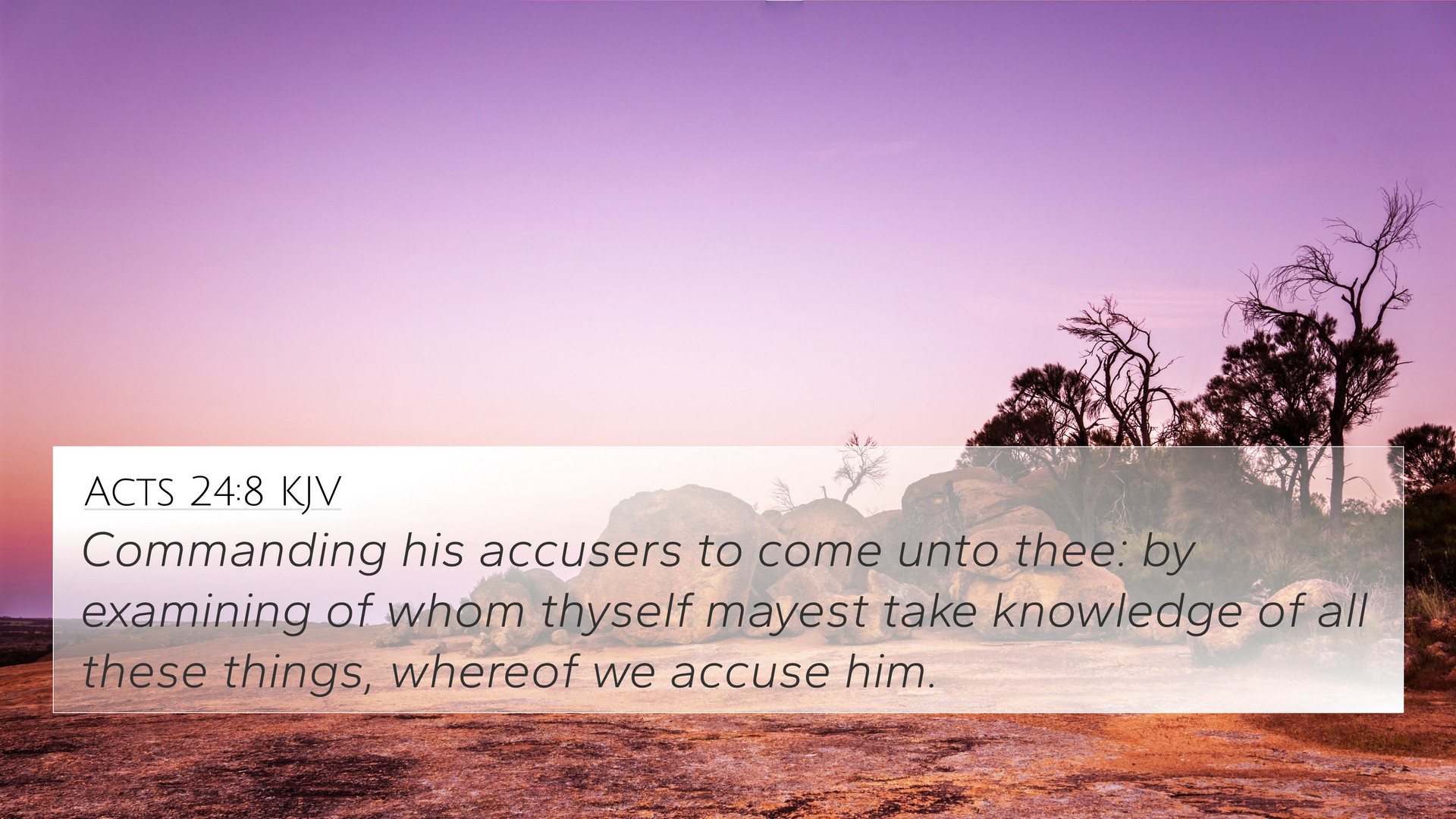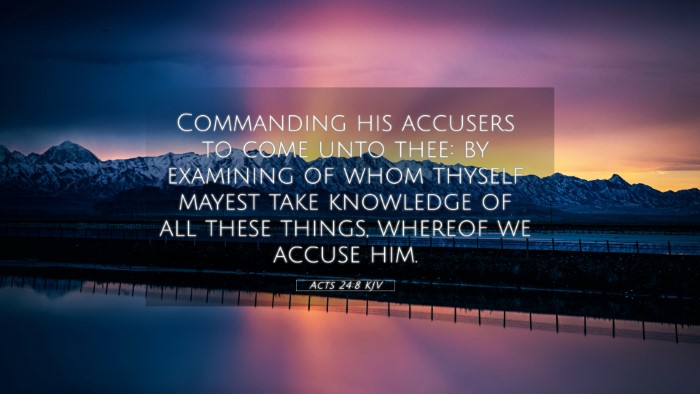Old Testament
Genesis Exodus Leviticus Numbers Deuteronomy Joshua Judges Ruth 1 Samuel 2 Samuel 1 Kings 2 Kings 1 Chronicles 2 Chronicles Ezra Nehemiah Esther Job Psalms Proverbs Ecclesiastes Song of Solomon Isaiah Jeremiah Lamentations Ezekiel Daniel Hosea Joel Amos Obadiah Jonah Micah Nahum Habakkuk Zephaniah Haggai Zechariah MalachiActs 24:8 Similar Verses
Acts 24:8 Cross References
Commanding his accusers to come unto thee: by examining of whom thyself mayest take knowledge of all these things, whereof we accuse him.
Uncover the Rich Themes and Topics of This Bible Verse
Listed below are the Bible themes associated with Acts 24:8. We invite you to explore each theme to gain deeper insights into the Scriptures.
Acts 24:8 Cross Reference Verses
This section features a detailed cross-reference designed to enrich your understanding of the Scriptures. Below, you will find carefully selected verses that echo the themes and teachings related to Acts 24:8 KJV. Click on any image to explore detailed analyses of related Bible verses and uncover deeper theological insights.

Acts 25:5 (KJV) »
Let them therefore, said he, which among you are able, go down with me, and accuse this man, if there be any wickedness in him.

Acts 25:15 (KJV) »
About whom, when I was at Jerusalem, the chief priests and the elders of the Jews informed me, desiring to have judgment against him.

Acts 23:35 (KJV) »
I will hear thee, said he, when thine accusers are also come. And he commanded him to be kept in Herod's judgment hall.

Acts 23:30 (KJV) »
And when it was told me how that the Jews laid wait for the man, I sent straightway to thee, and gave commandment to his accusers also to say before thee what they had against him. Farewell.
Acts 24:8 Verse Analysis and Similar Verses
Understanding Acts 24:8
Verse: "Commanding his accusers to come unto thee, and examining of whom they brought against him, if they had any thing against him."
Summary of Acts 24:8
Acts 24:8 is a pivotal verse in the examination of the Apostle Paul as he stands trial before Felix, the governor. Here, the focus is on the process of justice as Paul’s accusers are called to present their charges. The verse highlights the importance of due process in legal proceedings.
Key Themes and Insights
- Legal Authority: The verse underscores the authority of Felix to summon accusers and evaluate their claims, emphasizing the structure of legal governance during Roman rule (Matthew Henry).
- Due Process: It reflects the concept of fair hearing, where the accused has the right to confront his accusers, a principle valued in both biblical and modern justice systems (Albert Barnes).
- Defense and Accusation: The verse illustrates the dynamics of defense and accusation as Paul prepares to respond to the charges against him, preparing the groundwork for his eventual defense (Adam Clarke).
- The Role of the Accuser: In this context, we see that the onus is on the accusers to substantiate their claims, which aligns with biblical teachings on honesty and integrity in testimony (Matthew Henry).
- Historical Context: Understanding the significance of this trial requires a consideration of the political and social context of the time, as Acts narrates an early struggle between the church and state (Albert Barnes).
- The Importance of Truth: The pursuit of truth is critical, as seen in the legal proceedings, which serves as a reminder of the ultimate authority of truth, as reflected in biblical scripture (Adam Clarke).
Bible Cross References
Acts 24:8 can be cross-referenced with the following verses to provide a deeper understanding:
- John 7:51: "Doth our law judge any man, before it hear him, and know what he doeth?" - A reference to the due process in judgement.
- Matthew 18:16: "But if he will not hear thee, then take with thee one or two more, that in the mouth of two or three witnesses every word may be established." - This emphasizes the necessity of witnesses in accusations.
- Acts 22:30: "On the next day, because he would have known the certainty wherefore he was accused of the Jews, he loosed him from his bands, and commanded the chief priests and all their council to appear, and brought Paul down, and set him before them." - Shows the process undertaken by the tribune for a fair trial.
- 1 Peter 3:15: "But sanctify the Lord God in your hearts: and be ready always to give an answer to every man that asketh you a reason of the hope that is in you with meekness and fear." - Advocates for being prepared to defend oneself, similar to Paul’s situation.
- Isaiah 54:17: "No weapon that is formed against thee shall prosper; and every tongue that shall rise against thee in judgment thou shalt condemn." - Encouragement that God defends us in times of accusation.
- Psalms 37:6: "And he shall bring forth thy righteousness as the light, and thy judgment as the noonday." - Assurance of righteousness being revealed through adversity.
- Romans 13:1: "Let every soul be subject unto the higher powers. For there is no power but of God: the powers that be are ordained of God." - Highlighting the authority and the ordained nature of governance.
Connections and Comparative Analysis
This verse can facilitate a comprehensive analysis of the judicial processes depicted in the Bible, as well as comparisons to contemporary trials and justice systems. Insights from Acts 24:8 can be drawn upon by examining the following aspects:
- Linking Bible Scriptures: Other passages that deal with justice and legal matters can provide thematic connections, allowing for a deeper understanding of the biblical perspective on law.
- Inter-Biblical Dialogue: The practice of linking this verse to Old Testament legal principles emphasizes continuity in scriptural teachings about justice and moral integrity.
- Bible Verse Parallels: Similar scenarios in the lives of biblical figures can reflect on themes of facing opposition and the necessity of maintaining one’s integrity in the face of challenges.
- Tools for Bible Cross-Referencing: Utilizing a Bible concordance and cross-reference guide can enrich the study of Acts 24:8 by revealing other related scriptures that are thematically or contextually connected.
- Comprehensive Bible Cross-Reference Materials: Employing various cross-reference systems can assist in the exploration of the ongoing dialogue between various passages that discuss themes of righteousness, judgment, and divine justice.
Application for Study
This examination of Acts 24:8 provides insights that can contribute to personal study and sermon preparation. Here are suggestions for utilizing these revelations:
- Bible Cross-Reference Study: Engage in a structured study of Acts alongside its cross-references to uncover thematic links and deeper theological understanding.
- Identifying Connections: Analyze how New Testament writings reflect on legal matters compared to the Old Testament, offering a comprehensive view of biblical attitudes toward justice.
- Discussion Groups: Incorporate these insights into group discussions, focusing on the role of truth and justice in Christian life.
- Sermon Preparation: Use the connections and insights gained through cross-referencing as a foundation for developing sermons that explore themes of justice, integrity, and spiritual warfare.


